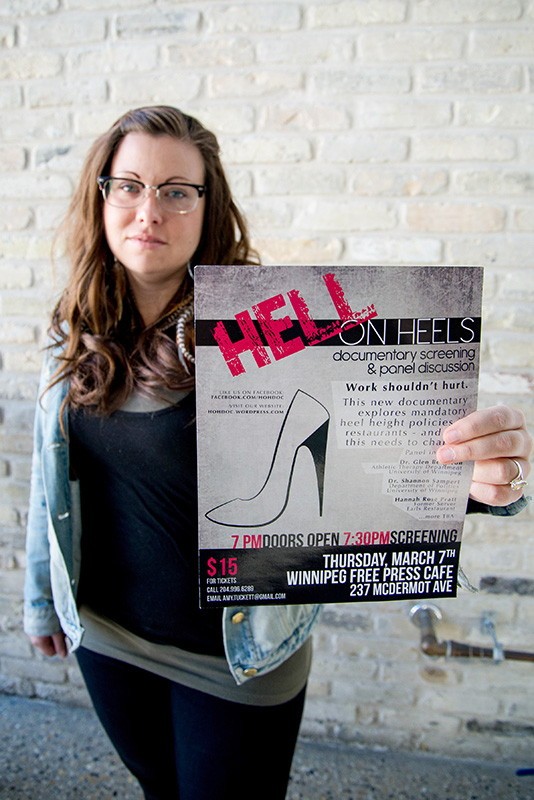Well-heeled?
Documentary explores mandatory heel heights in restaurants and its effect on health
How far would you go to keep your job? Fetch your boss’s lattes? Babysit your boss’s kids? Resist stealing the office supplies?
OK, you should be able to do that last one, but would you put your own two feet through hell in the form of a shoe?
The documentary Hell on Heels explores a policy that enforces mandatory heel heights for female servers in restaurants across Winnipeg.
A relatively unknown issue, this mandate has created issues that affect the women who adhere to the rule - even years after they quit serving.
Filmmaker Amy Tuckett, a Red River College student in the Creative Communications program, has been a massage therapist for eight years and has seen a large number of women come through with high-heel-induced complications.
Her clients’ issues, along with her own perspective as a former server, inspired the film, dedicated to abolishing the heel height policy.
The servers Tuckett interviewed stated that the formal policy enforces at least a one-inch heel with a nonslip sole. However, the women also revealed that their employers usually overlook the sole portion and encourage a higher heel.
According to Tuckett, the height can raise to “three inches, particularly if working in the lounge.”
If the girls don’t wear heels, they’re sent home.
Wait a minute. Why is this even an issue? I can’t go a day without seeing a woman strut her stuff in a pair of heels. Women love heels!
“ We know high heels can cause injury, both in the short and long term, so why isn’t SAFE Work acknowledging the young, female worker?
Amy Tuckett, Hell on Heels filmmaker
Well, what these women aren’t sharing is that heeled shoes have been linked to short-term problems such as bunions and hammer toe.
If that’s not incentive enough to stop this policy, high heels have also been linked to long-term issues such as arthritis and degeneration in the knees and lower back.
These injuries tend to make strutting difficult.
Yet, the audacity of the policy goes further than injury; it contradicts a provincial-wide program.
“It goes against everything SAFE Work supposedly stands for,” Tuckett says, speaking of an initiative of the Workers Compensation Board of Manitoba and Manitoba Workplace Safety and Health.
“We know high heels can cause injury, both in the short and long term, so why isn’t SAFE Work acknowledging the young, female worker?”
As consumers, we have the choice to deny our service to establishments that, as Tuckett puts it, “treat their staff like objects instead of human beings.”
Be that as it may, boycotting only goes so far, so Tuckett has set up a public petition that asks for a policy against mandatory heel heights. Access to the petition can be gained by visiting www.change.org, then going to the Manitoba High Heel petition.
In the comments section, one supporter who signed the petition shared her experience of working in a restaurant with such a policy. The supporter revealed she loved the work, but had to go through toe surgery as a result of spending so many hours in her high-heeled shoes.
Hell on Heels is being screened at the Winnipeg Free Press News Café on Thursday, March 7, with a panel discussion following the film. It’s sold out, but if you were already in the know and got your tickets, remember, heels are not mandatory for this event. In fact, just wear some flat shoes. Visit www.hohdoc.wordpress.com.
Published in Volume 67, Number 22 of The Uniter (March 6, 2013)








